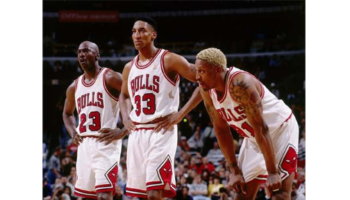As I reflect on the Chicago Bulls and the Last Dance documentary, another intriguing element that jumps out in their story is how the offense changed once Phil Jackson took over as the head coach.
Early in Jordan’s career, he made a quick impact on the floor and showed an incredible ability to score. They won some games, but they didn’t get to the next level.
Their offense was more “isolation basketball” with Jordan dominating the ball, but Jackson believed the Bulls would be more successful with a team-oriented approach.
Despite Jordan being hesitant at first, the “triangle offense” which emphasizes passing and strategic movement without the ball, resulted in six NBA Championships.
In a Chicago Tribune article from November 5th, 1991, which would have been a few months after the Bulls’ first championship, it describes the shift away from isolation basketball.
The quote from the then-head coach of the Golden State Warriors, Don Nelson, summed it up well:
”You look at the Bulls, and they play basketball the old-fashioned way. They basically had a player a lot of coaches before Phil Jackson isolated and gave the ball to, Michael Jordan, and let him do everything while the others stood around and watched.
”But Phil and his staff, with Tex (Winter) and John (Bach), all decided that’s not good basketball and let’s not do that. They said, ‘Let’s make everyone a part of the team. Let’s space instead of isolating,’ and they do that better than anyone in basketball now. They play basketball, and I commend them for that. They’re a fun team to watch.”
Of course, Michael Jordan still had plenty of time with the ball and took enough shots to score a ton of points for the Bulls, but it wasn’t because he was always in isolation.
Even a star player can’t remain in isolation, force bad shots, and expect to consistently win. As the Bulls demonstrated, keeping all of the teammates involved is paramount.
In our own lives, there’s also an important balance to implement when it comes to isolation. “Iso-ball” can be very negative for us if we’re always alone and don’t interact in meaningful ways with others.
During the quarantine, we’ve been convinced and reminded of this truth probably more than ever before. When we’re isolated from others we quickly become self-focused and don’t think as clearly without the genuine engagement with someone else.
We need to surround ourselves with Christ-centered “teammates,” so we can encourage one another toward godliness and purposely live alongside one another.
For the last month, we’ve been forced into isolation, but hopefully, we’ve learned from the experience and we’ll be motivated not to isolate ourselves moving forward.
In addition to our need to be physically around others, if we’re honest, sometimes our default is to try to do difficult things on our own and figure issues out by ourselves.
We also isolate ourselves by deliberately not involving others in our problems or pursuing our own selfish desires. However, there is danger in that approach, and Proverbs 18:1 (ESV) offers us this wisdom: “Whoever isolates himself seeks his own desire; he breaks out against all sound judgment.”
The Amplified version says, ”He who [willfully] separates himself [from God and man] seeks his own desire, he quarrels against all sound wisdom.”
We need to speak life, truth, and wisdom to each other. Just like in basketball, we need teammates who we can “share the ball” with. One player can’t win on his own – not even Michael Jordan.
The Bible says in Ecclesiastes 4:12 (NLT), “A person standing alone can be attacked and defeated, but two can stand back-to-back and conquer. Three are even better, for a triple-braided cord is not easily broken.”
I’m Bryce Johnson and you can UNPACK that!
PRAYER: Heavenly Father, help me understand the dangers of isolation and trying to live life on my own without anyone’s help. I pray You’d surround me with the right teammates so we can support each other. I pray this in Jesus’ name, Amen.
Discussion Questions for PACKS:
-
What has been the hardest part of this recent isolation?
-
Normally, what circumstances do you purposely isolate yourself from others when it comes to asking for help and involving them in your problems?






